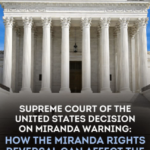Big Changes to Your “Right to Remain Silent”
 Thanks to the popularity of television police procedurals, one of the most recognizable rights Americans enjoy is the “right to remain silent.” “Anything you say can and will be used against you in a court of law. You have the right to an attorney. If you cannot afford an attorney, one will be provided for you.”
Thanks to the popularity of television police procedurals, one of the most recognizable rights Americans enjoy is the “right to remain silent.” “Anything you say can and will be used against you in a court of law. You have the right to an attorney. If you cannot afford an attorney, one will be provided for you.”
These are your Miranda rights, and since the 1966 Supreme Court case of Miranda v. Arizona, police have read these rights to criminal suspects during arrests and detainments. According to law, if a police officer fails to read a citizen their rights upon detaining them, anything that a suspect says while in custody should be excluded from the evidence used against them in a potential criminal trial.
Long ago, during the post-Civil War reconstruction period, Congress passed the Ku Klux Clan Act of 1871 which was meant to help guarantee basic civil rights – particularly necessary for people who had recently been freed from slavery. Section 1983 of this act allowed citizens to sue the government and law enforcement officers for civil rights violations. Lawyers frequently call these types of civil lawsuits “1983 claims.” Since the Miranda decision in 1966, citizens have been able to sue officers who failed to read them the Miranda warning upon detention or arrest.
That all changed in June of 2022 when the Supreme Court ruled that Miranda rights, although implied by the Constitution, are not, in fact, specifically noted in the Constitution. The Court calls the Miranda warning a “prophylactic rule,” meaning it exceeds the rights guaranteed by the Constitution and is therefore not protected by Section 1983. It means citizens cannot sue police officers who fail to Mirandize them before detaining them.
The events that initiated this recent Vega v. Tekoh Supreme Court ruling unfolded back in 2014 when a certified nursing aide named Terence Tekoh was accused of illegal and inappropriate contact with a patient at the hospital where he worked. Los Angeles Sheriff’s Deputy Carlos Vega interrogated Tekoh in a windowless room, and according to the suspect, threatened to deport him and his entire family unless he admitted to the crime and signed a confession. Deputy Vega disputes that claim, but he agrees that he never read Tekoh the Miranda warning.
Tekoh signed the confession and was tried twice in criminal court. During both trials, Tekoh refuted his signed confession, saying it was coerced. The jury at the first trial failed to reach a verdict – a mistrial – so Tekoh stood trial a second time. The jury at the second trial acquitted Tekoh, and as Hassan Kanu from the Reuters news service reports, Tekoh’s lawyers said members of the jury encouraged the defendant to sue for having his rights violated. He did, sparking a long legal process that went through the appellate courts and finally to the Supreme Court where he ultimately lost his right to sue for the Marinda violation – along with every other citizen of the United States.
Opponents of the Tekoh v. Vega decision filed a brief with the court which argued that 1983 claims both “offer individuals redress for the significant harms they suffer when a law enforcement officer fails to provide the appropriate Miranda warning,” and they “deter future violations by establishing meaningful sanction for the failure to protect this most basic of civil rights.” Without the deterrent of civil lawsuits, this brief argues, cops won’t be punished when they violate citizens’ Miranda rights, and the result will be more forced confessions.
Time will tell if the opponents of the Vega decision are right, but what is important for informed citizens to understand is that this ruling does not affect a citizen’s underlying “right to remain silent.” The Supreme Court ruled long ago that your refusal to answer questions cannot be used against you in a court of law to imply guilt, and whether a police officer reads you your rights or not, you are not obligated to answer their questions.
Criminal defense attorney Michael Panella says that most people misinterpret what Miranda means. Police officers can ask questions before they detain a potential suspect without reading the Miranda warning, and those statements can be sued against them in court. Police may also ask questions after reading the Miranda warning, and if the citizen waives their right and answers those questions, those statements can also be used against them in court. Where Miranda kicks in is when a police officer detains a citizen and asks questions without reading the warning. Attorney Panella says, “The real question is: At what point is there a custodial interrogation?”
Citizens don’t always know when they are in police custody. Just because a police officer has not placed you in a patrol car or slapped cuffs on your wrists doesn’t mean you aren’t “in custody.” Attorney Panella says it’s important to ask, “Am I free to leave?” If an officer indicates that you are not, then you are being held in police custody, and an officer should read you your rights.
The Supreme Court acknowledged that the Vega decision does not change the rule about excluding Miranda testimony from criminal trials, but dissenting Supreme Court Justice Elena Kagan warns that it takes zealous advocacy on behalf of the defendant to keep this type of evidence out, and she writes, “sometimes such a statement will not be suppressed. And sometimes, as a result, a defendant will be wrongly convicted and spend years in prison.”
While citizens can no longer file 1983 claims for Miranda violations, nothing in the Supreme Court decision keeps a citizen from suing for broader Fifth Amendment and other civil rights violations. Presumably, Tekoh didn’t have enough evidence to prove Deputy Vega threatened his family and coerced a confession – instead, to pursue a lawsuit, he had to rely on Vega’s admission that he failed to give the Miranda warning. If a criminal suspect had specific evidence of a coerced confession, someone in a situation like Tekoh could still potentially make a civil rights claim against an officer, regardless of the Vega ruling.
The lesson for informed citizens is that the Supreme Court’s Vega decision says you cannot sue a police officer for violating your Miranda rights, but it does not affect your fundamental right to remain silent. Whether a police officer reads you a Miranda warning or not, you should remember that anything you say could be used against you in court. During an officer patrol encounter, it is in your best interest to be polite to the officer and follow their lawful commands, but you don’t have to answer any questions you don’t want to. If you have any concerns, you can always ask if you are free to leave. If the officer says “yes,” you can walk away without saying another word. If the officer says “no,” then you know you may be facing some legal jeopardy, and you can exercise your right to remain silent.
 SHAWN VINCENT – LITIGATION CONSULTANT
SHAWN VINCENT – LITIGATION CONSULTANT
Shawn Vincent is a litigation consultant who helps select juries in self-defense cases, and he manages public interest of high-profile legal matters. If you have any questions for Shawn, or would like topic specific articles, please send your request to dopethemovementinfo@gmail.com attention Shawn Vincent Articles
Leave a Comment
You must be logged in to post a comment.


